- Home
- Laini Taylor
Blackbringer Page 3
Blackbringer Read online
Page 3
“Mags!” said Pup at her elbow. “Listen—Maniac and Mingus!”
Indeed, crows could be heard squawking frantically on the other side of the engraved door, but Magpie barely heard them. She could think only of what else might be behind that door. She darted forward and strained against it. Swig joined her and together they pushed it open. Maniac and Mingus fluttered out, croaking and cawing. Strong, stoic Mingus said only, “Thanks, Mags, fine to see ye,” but Maniac had worked himself into one of his rages.
“Where’s that dastard codger?” he fumed. “He shut us up in the dark to die! Let me at ’im!”
“Neh,” said Magpie, grabbing his wing tip. “You don’t understand what’s happened—”
“Don’t I? We came a-hunting that wind and the old prune trapped us here!”
“Maniac!” she said sharply. “Show some respect to the guardian of a Djinn!”
“Guardian? That gristle?” He paused then, realizing what Magpie had said, and repeated, “Djinn?”
“Aye, now hush,” said Magpie, turning toward the inner chamber. With a sickening feeling she saw it was utterly dark. A fire elemental’s cave devoid of fire? She swept past the crows and flared her spelled light. Its orange glow fell over the eight sacred pillars that graced all Djinns’ temples, and Magpie knew she was right about this place. On the ground she spotted a small circle of blackened stones. She flew to it and hovered above it. Inside it was nothing but ash.
“I outlived my master,” the old faerie had said. Magpie stared at the pit of ash. A Djinn had been dreaming here.
A Djinn was dead.
Her mind revolted. That old faerie was blind, he couldn’t know what had happened, but Magpie could, if she dared. Slowly she stretched out her hand, drew the glyphs in her mind, and ever so gently touched a fingertip to the ashes.
The force of the Vritra’s last memory seemed to scour her hollow. She crumpled over, clutching her arms round herself, choking for air that didn’t come. She could feel the Djinn’s mind screaming inside her as he was unmade. Smoldering flame giving way to a curl of dying smoke. Darkness, and the desperate dying wail of a second creature—a wind—as it was forced to use its own great power to snuff out its creator and spend its own life in the process.
There came a dry crust of a laugh at the very end and a terrible voice that whispered, “The fire that burns its bellows can only fall to ash. What poetry in a traitor’s death!” Then the Vritra knew no more, and Magpie was released from the memory to collapse sobbing to the ground.
It was only after many minutes of crow hugs and rocking and soothing that she began to come back from the depth of unfathomable loss and think about what she’d seen. A wind . . . It hadn’t been her grandfather, of that she was sure, but kin nonetheless. The devil had commanded a wind to extinguish the Djinn and the wind had been powerless to resist. The devil had known its secret name. What devil could wield such power? Only the Djinn knew the elementals’ secret names!
The shiver that had gripped Magpie on the fishing boat had long since deepened to dread, and now it deepened into something approaching despair. What had the humans loosed on the world this time?
“The devil is returned. . . .” That was what the old faerie had said. He knew what the beast was! Magpie struggled to her feet and returned to the antechamber where she’d left him.
He was still slumped on his knees, but his haggard face was uplifted in a posture Magpie had seen before, and he was muttering words in Old Tongue.
“Wait!” she screamed, darting toward him.
But she was too late. She reached him just as the light left his clouded eyes and he slumped forward, dead. He had released himself to the Moonlit Gardens, leaving his sad old body behind.
“Neh neh neh . . . ,” she said frantically, trying to shake him awake, knowing it was futile. “Not yet, not yet,” she whispered. But he had gone.
The Moonlit Gardens were the faeries’ next world, a calm silvered land they traveled to on a day of their own choosing—unless some violence chose the day for them—and from which there was no return. This old warrior—for such he surely was, of the legendary Shadowsharp clan who had guarded the Vritra in ancient days—had long outlasted his life. Faeries could live a thousand years, more if they were stubborn, but never this much more. Magpie had thought the Shadowsharp clan long dead. She couldn’t even guess what will had enabled this one to hold on these centuries past his time. He must have been the last of his clan, unwilling to leave his master alone in the world. What a cruel fate then to fail and live on, all those tired, lonely centuries for naught.
This was a new kind of wickedness in a devil, to recognize a fate worse than death and inflict it. But now the old warrior had let go, and so died the last of another great clan. So many bloodlines had ended without heirs—like Bellatrix’s, to the world’s lasting sorrow. Many others might as well have. With the sad state of magic in this age, faeries bore little resemblance to their glorious forebears. Magpie mourned for bygone days more than most of her folk, because she knew better than they what had been lost. Much had been lost, was being lost every day. That loss was the shape of her life: the struggle against it, the hunt, the unending journey, the hollowness of suspecting that ultimately her family’s work was in vain. That they were as ants trying to stop a landslide by catching one pebble at a time.
The greatness of her folk was past.
Magpie laid her hand over the wizened fingers of the old warrior, closed her eyes, and blessed him in silence. But she cursed him too. A few more moments, she thought. If he had only waited he could have told her what manner of devil this hungry one was! Whom could she ask now? She could track the invisible trail of death memories until she added her own to it. Or . . .
She began to chew her lip and a sharp focus gradually came back into her eyes.
“What ye pond’rin’, ’Pie?” asked Calypso, who knew her looks.
“Whatever this snag is,” she said, “it’s like nothing we’ve fought before.”
“Nothing in the world,” he agreed.
“Nor nothing we’ve heard or read of.”
“Neh.”
“And the only soul we’ve found that’s seen him just took himself where we can’t follow.”
“Aye, and hasty.”
“So there’s only one thing to do.”
“Aye . . . eh?” He squinted at her. “What?”
“We got to find the Magruwen, neh? Ask him about it.”
Calypso gaped, his feathers instantly puffing up. “Find the Magruwen? Jacksmoke, ’Pie! Ye tetched?”
“Neh, feather, listen. Now we know we been right about the Djinn—they’re alive and they’re in the world! My parents have been hunting this proof all my life!”
“Let’s tell them, then! Let them decide what to do!”
“There’s no time for that! They’re halfway round the world and there’s a devil on the loose—a bad, strange beast that’s eating every low snag in its path and sure every faerie too. How many more will he get whilst I ask my parents’ permission? I’m not a sprout anymore!”
“Ye’ll be a sprout till I say ye’re not!” Calypso cried. “Look at ye, twig of a lass! Scarce gone a hundred and jaunting off to find the Djinn King? Tetched, I tell ye!”
The other crows had gathered round. “The Djinn King?” repeated Pup in an excited chirp. “Mags, ye going to find the Djinn King? Eh, Mags?”
“I’m going to try,” she said defiantly, her eyes not leaving Calypso’s.
“But Mags,” worried Pigeon, who had a glorious imagination for doom. “En’t he a fierce old scorch, though? He’ll toast ye up like a dragon’s hankie!”
“That’s if ye can even find him,” added Calypso.
“Aye,” said Bertram, blinking at her through the thick eyeglasses perched on his beak. “And sure he don’t want to be found! Maybe ye don’t remember it—ye were just a babe then, but we seen his temple at Issrin Ev, neh? What he left of it, anywhich, and that weren’t muc
h. Even Bellatrix’s statue got its head knocked clean off, and weren’t she his own champion?”
“Aye,” said Calypso. “Whatever made him leave his temple, it weren’t a happy business. And he’s stayed gone all these years, ’Pie. He’s through with the world!”
“You don’t know that!” she protested. “No one knows what happened then! Ach . . . don’t you see, birds?” She gestured toward the Vritra’s cave. “Suppose this is only the start! Suppose he goes after all the Djinn?” The crows blinked at her. She added, “Who knows whether the world could survive that?”
The crows closed their beaks and shuffled their feet and considered. At last, reluctantly, Calypso said, “Put it like that, maybe we ought to try to warn him,” and the other crows agreed one by one.
Magpie nodded. “Right. To Dreamdark, then.”
“Dreamdark . . . ,” they murmured. “Been a long old time.”
“Aye, Mags, been scores of years since ye been home.”
“Home? Piff!” she replied. “You’re my home, my feathers. Dreamdark’s just some place I was born.”
“Just some place?” repeated Calypso with a short hoot. “Dreamdark? Been too long since ye seen it, if ye can say that.”
She scowled. “This is no sightseeing trip. Now come on, let’s give this brave codger a decent burial before we go.”
As she turned away she thought she heard something, a faint pure ringing of crystal, and her eye fell on the knife she had earlier wrenched from the skeleton’s spine. She hesitated, knelt, and picked it up. The sound was gone and she wondered if she’d heard it at all. The dagger showed no signs of all the years it had lain here. Its blade shone like a sunlit mirror as Magpie slowly turned it, seeing faint arabesques and spirals etched into its steel. A pretty, deadly thing. She searched around until she found, strapped to a skeleton’s thigh, a fine scabbard equally untouched by age. With a feeling of unease she loosed it from the bone and strapped it to her own leg.
She didn’t recognize the designs engraved in the blade as runes or she would have looked it over more carefully. Most were symbols long fallen from knowledge but the glyph for curse, at least, would have been familiar. As for the graceful letters that spelled out Skuldraig, they were writ in the alphabet of a forgotten time and to her eyes seemed only an elegant design.
FOUR
With the vultures egging him on, the imp thrust his nose out into the world. It was the least ratlike part of him, his nose, flesh while the rest was fur, and quite spectacularly large, with each nostril spacious enough to fit his big toes into—which he frequently did. But though large, it was dainty in its way, and it flushed a delicate crimson as soon as he caught the scent of humans.
He thrust his head farther and peered out through the hedge. He saw human lasses leaping about with butterfly nets, dancing near the woods then shying back, fascinated and terrified. Such was the lure of Dreamdark.
The humans had their own name for this most ancient of forests, and their school sat at its very edge, separated from it by only the hedge. But what a hedge! It was an evil bramble, taller than tiptoes and dense as a mermaid’s braid, and it encircled the great wood in an unbroken band. Meddling mannies had found their torches wouldn’t set it ablaze, and those who tried to chop it down would feel the axe seized from within and wrenched from their hands. They stayed away, called it haunted, claimed beasts and fey creatures lurked within.
They were right.
“Jenny Greenteeth and Nellie Longarms!” chanted the lasses, daring each other near.
“Old Rawhead and Hairy Jack!”
“All the bogeymen together, sitting down to tea!”
Batch Hangnail, the imp, shifted impatiently in the hedge, brambles poking at his meaty backside. Ordinarily the sight of new mannies from whom to scavenge would have excited him, but today he was a pawn in a bigger game.
Once the lasses had raced away in pursuit of a butterfly, he made a crude gesture to the vultures and shoved his bulk through the hedge. He dashed across the rutted path toward the school’s formal garden, following his whim to the strange unkempt place at its edge. Though the rest of the gardens were blooming and bonny, pruned and tidy, this spot was dreary, a tree-shaded circle of weedy bricks with a well at its center.
He climbed the mossy stones and peered down into the darkness, feeling a little flutter in his belly. He wasn’t afraid of the dark, certainly. The dark was his favorite. And wells, he’d been down many. He’d found his best diamond ring in a well, and a number of gold-capped teeth still clinging to their jaw, and the monogrammed handkerchief he wore tied satchel style over his shoulder. He clutched it against him now to ease his aching heart.
His treasures—ah, his treasures! His wheelbarrow full of treasures was so far away now in Rome, and unless he did just as he was told, he might never see it again! He still had his rings, for he wore them on his bristly tail. But all the eyelashes he’d gathered from the cheeks of sleeping children, the hanks of their unwashed hair, the belly button lint, the baby teeth—ah, the baby teeth!—as good as lost, and why? Because an ill-timed feast of rancid kidneys had made him sleepy, and while others fled the catacombs he snored, to awaken to the terrible voice . . .
An ancient reek wafted up from inside the well and Batch breathed deeply, excited in spite of himself. Perhaps this task would have its own rewards, he thought. Then, with scuttling grace, he climbed in and began his long descent. Down he went, and down and down. And down some more! “Munch,” he muttered. “ ’Tis devious deep.” No ordinary well was this deep, but Batch already suspected this was no ordinary well.
Some time passed and his little arms and legs grew tired, and the stones became slimier and slipperier. He began to fret. He was already down so deep now he didn’t know if he could climb back out. He imagined his wheelbarrow lying unclaimed forever in the dusty pelvis of that human skeleton back in the catacombs. The thought was so wretched it made him twitch just as he reached for a slimy handhold . . . and he missed! His arms windmilled as down, down, down he fell, until with a squelching thud he met mud and was buried up to his nose in it, with just those grand pink nostrils poking up. He snuffled deep breaths of rank, sulfurous air through them, letting the good bad smell clear his head. Then he began to fumble about for a toehold in the muck.
By the time he had floundered his way out of it, Batch was a dirtier and richer imp than he had been moments before. Filth-crusted from the top of his head to the tip of his tail, he admired his new silver coins—tossed here, he knew, by silly mannies trying to buy wishes—and one old rusty key. He shoved the key into his satchel along with the coins, trusting his gift enough to know that when he found a thing, there was likely a use for it around the bend.
He padded around the pit of the well until he found a deep-set door. A door that had not been opened for centuries. At his push it creaked inward and the air from the well shaft flowed in and over a lake of smoke, finding and feeding a low smoldering ember in the depths of the cavern.
The ember glowed brighter.
Batch took one slinking step over the threshold.
Suddenly the ember sparked into flame and reared like a waking beast. Salamanders leapt from stalactites and scurried away as it flared and spun and stretched limbs of fire. Its bright dance seared the eyes, too hot to look upon. Batch flung his hands over his face.
He had found what he sought. He always did.
The fire turned slowly toward him. It didn’t know how long it had slept. Long. It didn’t know if it wanted to wake. The old malice had awoken with it, and also a dull awareness of a new presence in the fabric of the world. Or a new absence. Or both.
“Who comes?” it hissed.
Batch stumbled forward. “M-m-my Lord Magruwen,” he stammered, eyes downcast. “Forgive my intrusion. I bring you a riddle!”
Once, the Magruwen had cherished riddles. In the long-gone days of visitors he had traded treasures for them. There were no more visitors now—he had gone deep where no one would
find him. And yet here was an imp, smelling of graveyards and drains. The Magruwen started toward him, then paused. He hadn’t worn his head for a very long time. He sucked himself together out of the swirling vapors of his cavern and funneled himself into an ancient skin, buttoning it up and settling the head on last. His eyes burned through vertical slashes in the mask, and where the skin was worn thin, flames could be seen dancing inside it.
“Who are you?” he demanded in a voice to scald the ears.
Trembling, Batch answered, “I am Batch, Lord. Just a lowly imp. A low creature . . .”
“Low creature?” repeated the Magruwen. “You insult the craft of the Djinn who shaped your kind. We made no creature low. If you are low it is because you choose to creep. Are you low?”
Batch froze. His master had schooled him in just what to say and he’d already botched it. What was he to answer? Was he low or wasn’t he? No ideas came to him, so he blurted, “The riddle, it’s new!”
Fume hissed from the Magruwen’s mask like a sigh. “Ask,” he said.
With relief Batch straightened up, cleared his throat, and recited,
“I have a dozen wings to rake the sky,
a dozen eyes to find the dead,
A thousand souls within my guts,
a single will in many heads.
I’ve drifted in the ocean’s womb,
I’ve prowled through catacomb and tomb.
I’ve swept the cobwebs from the clouds,
I’ve wiped my talons clean on shrouds.
I’ve soul of shade and heart of smoke,
I’m ink and stain and clot and cloak.
I’m what you’ve never dreamed about.
I’m tongues gone dumb and fires put out.
What am I?”
Fires put out? The Magruwen gave a snort that sent fireworks and salamanders streaming from his eyes and buttonholes. This was an audacious imp, to come before a Djinn and speak of putting out fires! But the Magruwen ceased thinking of the imp when the answer to the riddle brushed his mind like the wing tips of a moth. He flicked it away. It was impossible, just a fancy, and one he was only too glad to ignore. After all, he didn’t care about riddles anymore.

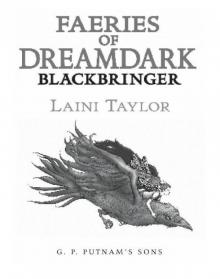 Blackbringer
Blackbringer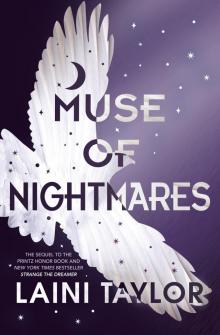 Muse of Nightmares
Muse of Nightmares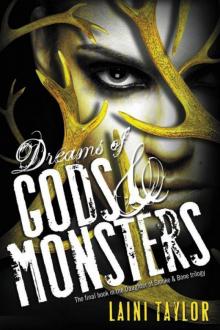 Dreams of Gods & Monsters
Dreams of Gods & Monsters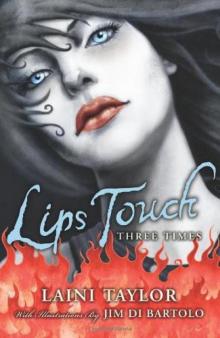 Lips Touch: Three Times
Lips Touch: Three Times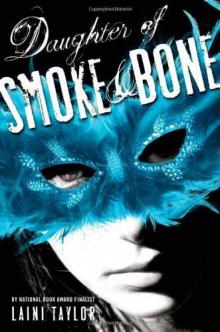 Daughter of Smoke & Bone
Daughter of Smoke & Bone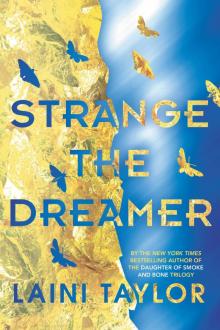 Strange the Dreamer
Strange the Dreamer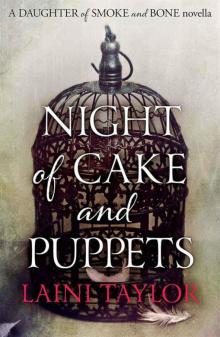 Night of Cake & Puppets
Night of Cake & Puppets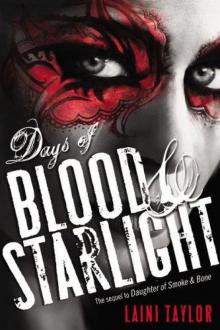 Days of Blood & Starlight
Days of Blood & Starlight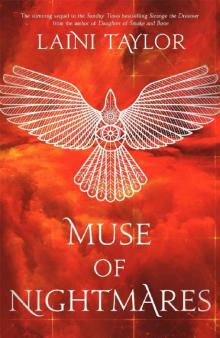 Muse of Nightmares (Strange the Dreamer #2_UK)
Muse of Nightmares (Strange the Dreamer #2_UK)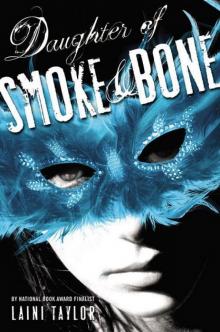 Daughter of Smoke and Bone dosab-1
Daughter of Smoke and Bone dosab-1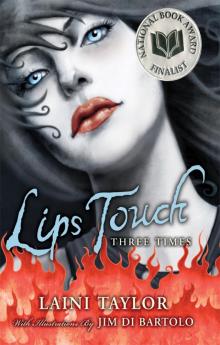 Three Times
Three Times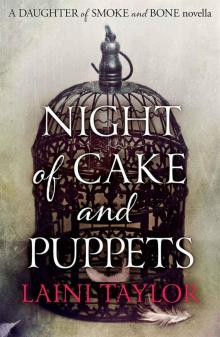 Night of Cake and Puppets (a Daughter of Smoke and Bone novella)
Night of Cake and Puppets (a Daughter of Smoke and Bone novella)